Department News
Letter from the Chair
Steven Wagschal
Dear Alumni and Friends,
Warm greetings from Bloomington! This year marked the 50th anniversary of IU's study-abroad program at La Pontificia Universidad Católica del Perú. A wonderful example of our Department's long-standing leadership in academic study-abroad, our Peru program was initiated by Professor Merle E. Simmons and was the very first US program in the Southern Hemisphere.
The Department hosted a major international conference in 2018-19: International Education at the Crossroads, co-organized by Professor Deborah Cohn. The conference boasted a keynote lecture by Dr. Jonathan F. Fanton, President of the American Academy of Arts & Sciences (AAAS). In addition, the graduate student association of the department, GSAC, organized the annual Diálogos Conference now in its 16th year, featuring three keynote lectures representing our programs in Linguistics, Literature and Culture, and Portuguese.
Among splendid developments this year, Professors R. Andrés Guzmán and Jonathan Risner were promoted to the rank of Associate Professor with tenure, and Professors Ryan Giles and Reyes Vila-Belda were promoted to the rank of Full Professor. Also, Professor Kimberly Geeslin was awarded the David and Cheryl Morley Career Distinguished Teaching Award by the College of Arts and Sciences "intended to recognize a career of distinguished service in the classroom and related pedagogical endeavors." You can read about the accomplishments of these and other colleagues in the Faculty News and Awards pages. I am also happy to announce that our indefatigable and meticulous staff member Karla Allgood was recognized for her 30th-year milestone of service to Indiana University.
Our students continue to excel: Nine of our majors were awarded the Indiana Outstanding College Student of Spanish/Portuguese Award by the American Association of Teachers of Spanish and Portuguese (AATSP); 26 Spanish majors were inducted into our local chapter of Sigma Delta Pi, the national Spanish honors society; and 26 of our majors were inducted into Phi Beta Kappa, the oldest and most prestigious of all national honors societies in the US. Several majors were also awarded prestigious scholarships, fellowships and prizes from the College of Arts & Sciences, from Indiana University Bloomington, and from the Fulbright program.
Graduate students in the Department were recognized with an enormous number of fellowships and grants this year. Among them, Carly Henderson, Gaelle Le Calvez, Laura Merino and Valentyna Filimonova were all awarded year-long dissertation fellowships from the College of Arts and Sciences; Travis Evans-Sago was awarded the President's Diversity Dissertation Fellowship; Mark Fitzsimmons won the Latino Studies Dissertation Year Fellowship; and Derek Allen, Molly Cole, and Sean McKinnon all received FLAS Fellowships. We are also very proud of the eight doctoral students who successfully defended their dissertations during the academic year: Cristóbal Garza-González, Matt Johnson, Cynthia Martínez, Elizabeth McDyer, Tamara Mitchell, Andrea Mojedano-Batel, Joseph Pecorelli and Victor Rodríguez-Pereira. Several of the graduating doctoral students and other recent doctoral graduates accepted positions at other universities where they will move on to the next phase of their careers.
I must also share two pieces of sad news with you. Our emeritus colleague, Professor John Dyson, passed away on February 23, 2019. A Celebration of Life was held for him on the Bloomington campus in March 2019 which was attended by family, friends and colleagues. Also, a dear friend of the department, Concepción Simmons (widow of Emeritus Professor Merle E. Simmons), passed away on December 18, 2018, and her funeral was held at St. Paul's Catholic Center.
If you will be coming to town, be sure to let us know so that we can welcome you personally. The "News and Events" page https://spanport.indiana.edu/news-events/index.html of the Department's new website will be the place to look if you are interested in attending any of the activities planned for 2019-20, such as the 2019 MESDA lecture which will be delivered by distinguished alumna Dr. Cindy Brantmeier (PhD 2000), in conjunction with our annual Fall party on September 13, 2019. Dr. Brantmeier is Professor of Applied Linguistics and Education and Director of Applied Linguistics at Washington University in St. Louis.
Many of the culturally- and intellectually-enriching activities highlighted in this newsletter are funded in part with the generous support of our friends and alumni, without which we would not be able to do many of the things that we do. Thus, we are incredibly grateful to all those who have made a commitment to the excellence of the department by contributing intellectually, personally, and financially.
It is with some wistfulness that I mention one last piece of news: this will be my last missive as Department Chair, as I am stepping down from this role at the end of my term. It has been a pleasure and honor to serve this excellent and wonderful department in this capacity since 2012. As of July 1, 2019, our new chair will be Prof. Manuel Díaz-Campos, and I wish him all the best throughout his term.
Hasta luego, Até logo, Fins aviat,

Steven Wagschal
Chair, Department of Spanish and Portuguese
Department Alum Mónica Díaz Presents 2018 MEDSA Lecture
Chair, Steven Wagshal, gives MEDSA award to Mónica Díaz, 2018 MESDA
Since 1996, the Department of Spanish and Portuguese has paid tribute to a long-serving and distinguished emeritus professor through an alumni lecture in his honor. Professor Merle E. Simmon was a professor and scholar of Spanish American Colonial Literature at IU from 1942 to 1983. Professor Simmons' contributions to the department and to scholarship included authoring seven books, developing the program of study in Spanish American Colonial Literature at Indiana University, and serving as director of graduate studies for seven years and department chair for five.
Each fall, the department honors Professor Simmons by inviting a distinguished alum to visit Bloomington, speak to the department's faculty and students, and reconnect with his or her roots as a part of the Merle E. Simmons Distinguished Alumni (MESDA) Lecture.
In September, Professor Mónica Díaz (PhD '02, Indiana University) presented the annual MESDA lecture in honor of Professor Simmons. As a dual PhD in Spanish and History, Professor Díaz is an internationally renowned scholar of colonial studies with a specialization in Mexico. Currently an Associate Professor in Hispanic Studies and Director of International Studies at the University of Kentucky, her most recent work, an edited collection entitled To be indio, is an important contribution to our understanding of what social factors contributed to the creation of colonial categories of belonging, in particular, the formation of what would become the "indio." More broadly, her research studies colonialism, religion, and gender alongside race and ethnicity. Professor Díaz is the author of Indigenous Writings from the Convent: Negotiating Ethnic Autonomy in Colonial Mexico (2010), dozens of articles, editor of several collections of essays, and is completing her second monograph.
In her talk,"'Indias no tan nobles': Native Petitions and the Rhetoric of Purity in Colonial Mexico",, Professor Díaz presented her work-in-progress for her new book, Indigenous Education and the Church during Mexico's Enlightenment. Drawing on previously unstudied archival materials that demonstrate the active engagement of indigenous peoples with the colonial Church, she examined documents written by both caciques and indigenous nuns petitioning for the founding of seminaries for indigenous men and the opening of additional convents for indigenous women. As evidence of indigenous participation in the lettered European culture of the time, these appeals shed light on the ways in which colonial identities could be refashioned by drawing upon the discourse of the "indio" and appealing to rights they had been granted a century earlier in the Laws of the Indies. While expressing a clear sense of belonging to an indigenous community, these native leaders employed the rhetoric of pureza de sangre imported from Spain at the time of the conquest and adapted for new, and often successful, ends in colonial Mexico.
Crossroads Symposium
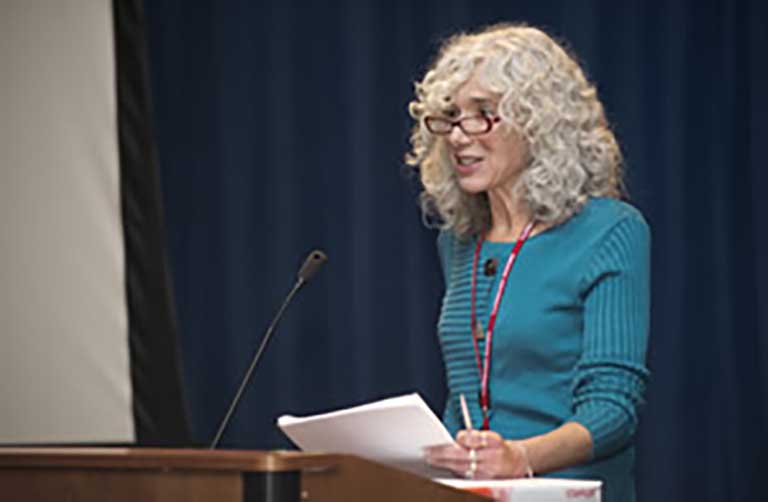
Professor Deborah Cohn giving opening remarks
at the symposium.
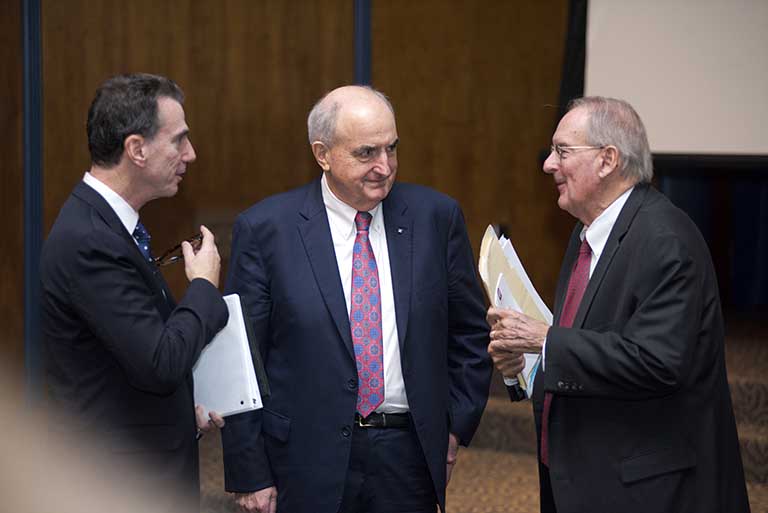
Dean Lee Feinstein (HLS), President Michael A. McRobbie,
Jonathan Fanton (President, American Academy of Arts &
Sciences) in conversation after Dr. Fanton's keynote
address.
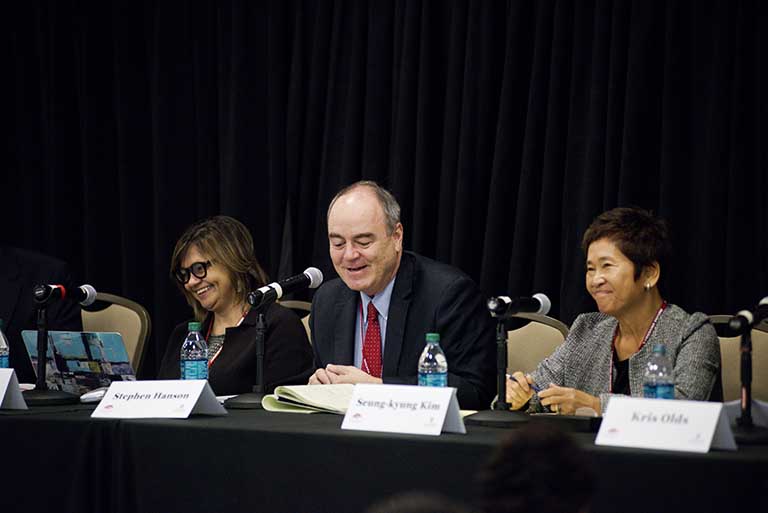
Steve Hanson, Vice Provost for International Affairs,
College of William and Mary, speaking on the importance
of Title VI funding in the session on "Priorities and New
Directions in Global and Area Studies."
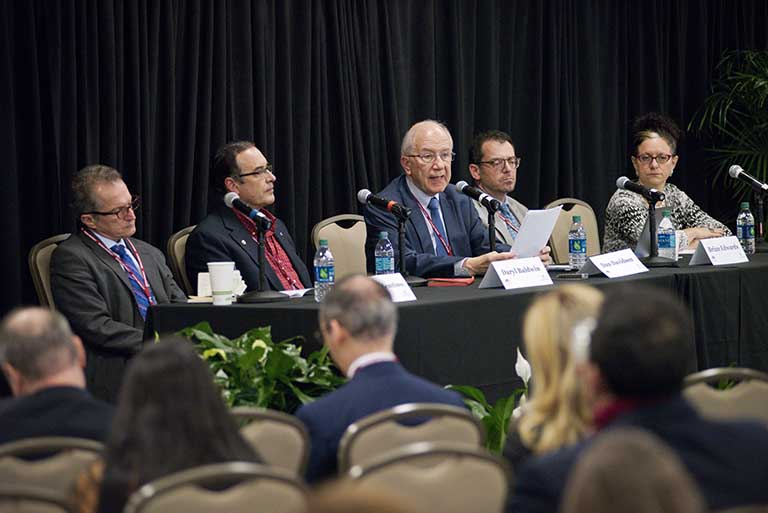
Russell Valentino, Daryl Baldwin, Dan Davidson,
Brian Edwards, and Kim Potowski. Professor Dan Davidson
offering his remarks on the panel on
"Priorities and New Directions in Language Study."
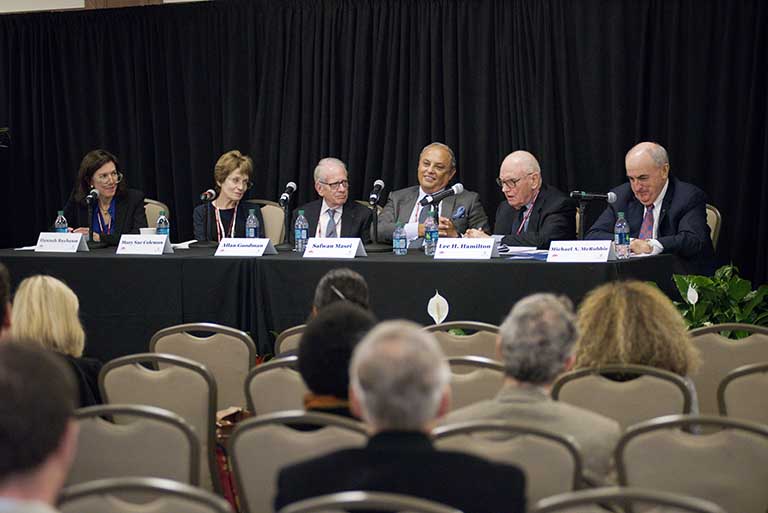
Hannah Buxbaum, Mary Sue Coleman, Allan Goodman,
Safwan Masri, Lee H. Hamilton, and Michael A. McRobbie.
Congressman Lee Hamilton speaking on the panel convened
by IU president Michael A. McRobbie.
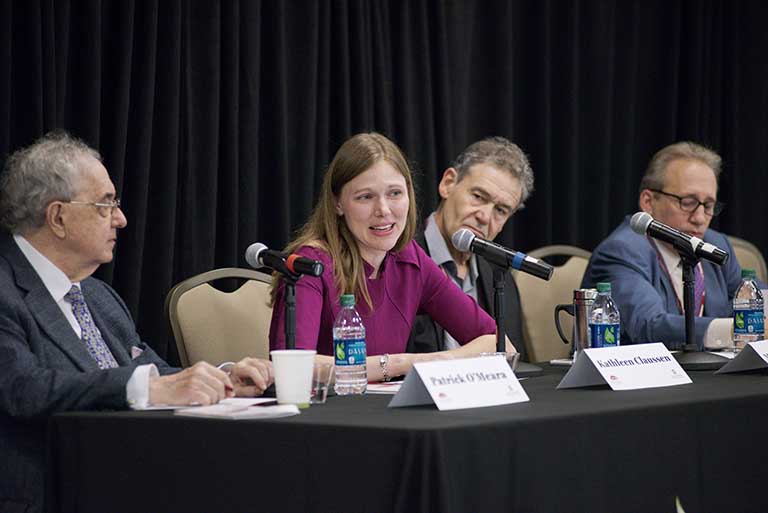
HISP alum Kathleen Claussen participating in the panel on
International Education in Action: IU Perspectives on
Careers. Also on the panel were Dean Patrick O'Meara,
Michael Hamburger and Eric Hershberg.
In October, 2018, Indiana University hosted its first Bicentennial Symposium, "International Education at the Crossroads." Organized by Deborah Cohn, Professor of Spanish and Portuguese, and Hilary Kahn, Assistant Dean for International Education and Global Initiatives and the Director of the Center for the Study of Global Change in the Hamilton Lugar School of Global and International Studies, the symposium marked the 60th anniversary of the passage of the National Defense Education Act, and, in particular, its Title VI programs, which have been instrumental in funding language and area studies at colleges and universities across the United States since 1958.
The Symposium opened with a keynote lecture by Dr. Jonathan Fanton, President of the American Academy of Arts and Sciences, on "The Broadest Possible Education: The Future of Global and International Studies." Dr. Fanton discussed the findings of the AAAS's 2017 report, America's Languages: Investing in Language Education for the 21st Century, as well as initiatives emerging from the Commission on Language Learning that produced it. Other panels addressed current priorities and new directions in global and area studies and language study, the value of and need for international education, and the experiences of IUB alumni—including Department of Spanish and Portuguese alumni Kathleen Claussen and Eric Hershberg—and faculty with integrating their language and area studies training into their careers.
IU President Michael A. McRobbie convened a panel featuring Rep. Lee Hamilton, Allan Goodman (President, Institute of International Education), Mary Sue Coleman (President, Association of American Universities), and Safwan Masri (Executive VP for Global Centers and Global Development, Columbia University) that examined institutional programs, needs, and challenges. A second keynote lecture was given by Diane Auer Jones, Principal Deputy Under Secretary in the Office of Post-Secondary Education, U.S. Department of Education, and a concluding panel in which representatives of programs in the US Department of Defense, Department of Education, Department of State, and the American Council on Education discussed their offices' roles in shaping the future of international education. Over 200 people attended, including students, faculty, administrators, and educators from IU, the city of Bloomington, throughout Indiana, and across the nation.
Professor Emeritus Martins Donates Personal Collection to the Lilly
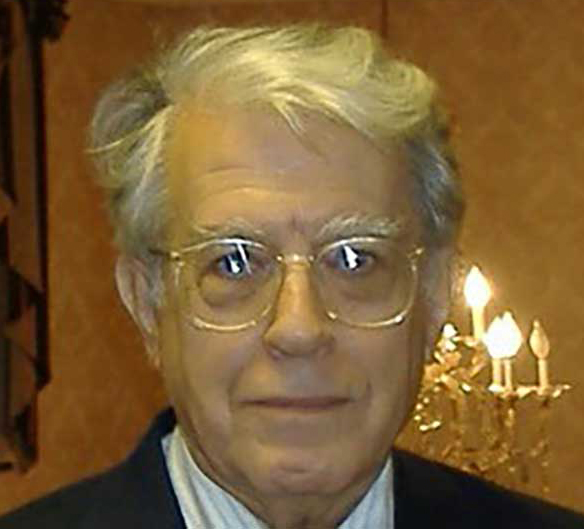
Heitor Martins
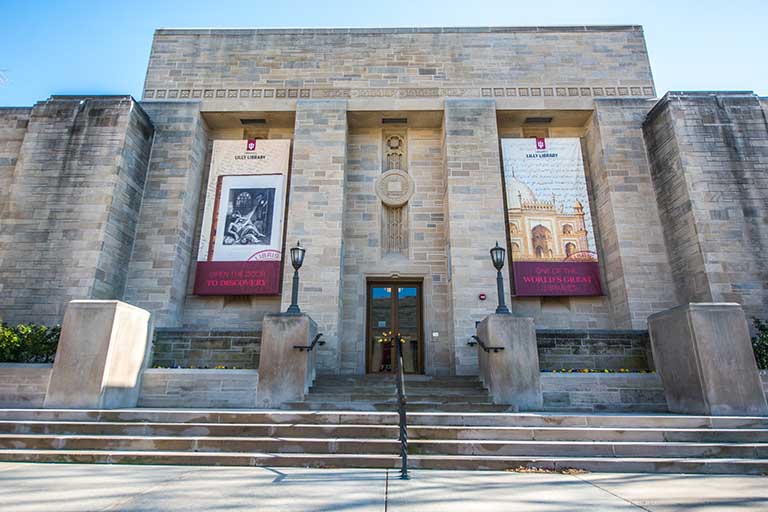
Lilly Library
by Olivia Holloway and Professor Luciana Namorato
The Lilly Library is a jewel for research and curiosity nestled in the Midwest. Among its rich attractions are collections featuring rarities of interest to scholars of the Lusophone world. With the generous donation by Professor Emeritus Heitor Martins of his personal library of books and manuscripts on Brazilian literature, this collection has grown in size and exceptionality.
The Martins family recounts that the Indiana University Library system had to make two trips to collect the entire donation. The first load of forty boxes of materials was retrieved a few years ago, while the second load of materials, given in the summer of 2018, contained seventy boxes. The Lilly Library team estimates to have catalogued seventy-five percent of the first delivery, which already totals more than four hundred items. By modest estimates, the entire two-tier donation will total more than a thousand items.
The Heitor Martins Collection ranges from colonial times to the modern period. It includes the first and third editions of the moralistic novel Máximas de virtude e formosura (1777), also called Aventuras de Diófanes, by Teresa Margarida da Silva e Orta, the first novel written by a woman in Brazil. A number of the rare books and manuscripts were collected by Professor Martins in bookstores in Portugal. The eighteenth-century manuscript of O caminhante curioso, by Portuguese missionary Manuel de Seixas, has a fascinating history, since it travelled from Brazil, to Portugal, and then finally to Bloomington, Indiana. The manuscript—whose existence is documented in Padre Serafim Leite's seminal História da Companhia de Jesus no Brasil—had been sent to the metropolis by its author, likely in an attempt to see it published in Portugal (the colonial government did not permit the establishment of printing presses in Brazil before 1810). This work is a catechism manual with novelistic elements, in a crude attempt at imitating Bunyan's The Pilgrim's Progress, and was found, by chance, by Professor Martins in a bookstore in Porto. There are also manuscript anthologies of eighteenth-century poetry and the manuscript of an unpublished "poema trágico-amoroso," in ten cantos, in Spanish, by Frei Antônio das Chagas (1631-1682), one of the most famous authors of sermons in seventeenth-century Portugal.
Also purchased in Portugal by Professor Martins was the rare first (and only) edition of Basílio da Gama's Quitúbia (1791), an epic poem celebrating an African chief who aided the Portuguese and was victorious in the war against the Queen Ginga in Angola. The first edition of Orbas (sic, 1762), by Cláudio Manuel da Costa, is present in a volume whose title page was reconstructed by an anonymous artist. In the Martins Collection, one also finds the first edition of Romantic poet Gonçalves Dias's Segundos cantos (1848), with a dedication from the author to Portuguese writer, Alexandre Herculano. The collection also includes the first edition of Aluísio Azevedo's O mulato and the naturalist novel O homem, with a cover designed by the author, a personal dedication to Gervásio Lobato, and an added signature of Fialho de Almeida. Brazilian modernism is well represented, including the first edition of Paulicéia desvairada (1922), by Mário de Andrade, several works by Oswald de Andrade with personal dedications, and a first edition of Eu (1913), by Augusto dos Anjos. Several publications by the São Paulo concrete poets, with personal dedications, are also present. There are also works by Jorge Amado and Sérgio Buarque de Holanda with personal dedications. The Martins Collection also includes nine hundred issues of the Suplemento Literário de Minas Gerais (out of around a thousand existing issues), dating from the 1960s to about 2014. The Suplemento continues to be published and remains one of the most important literary supplements in Brazil.
While most of the donated items are representative of key moments in Brazilian literary history and its canonical authors, others are significant for their pioneering role in the history of print in Brazil. Such is the case of the 1819 Portuguese translation of Chateaubriand's novella Atala, ou Les Amours de deux sauvages dans le desert, which was one of the first books published in Brazil outside the official Portuguese royal press. Some works in the collection are valuable for their intrinsic curiosity. Among these, one stand-out is the novel Los dos soles de Toledo (1641), one of the five Novelas ejemplares by seventeenth-century Portuguese writer Alfonso de Alcalá y Herrera. Each of the five novels is written without one of the five vowels; Los dos soles de Toledo is written without using the letter "a."
The collection reflects Professor Martins's research and teaching interests, which covered a broad range of topics. One of his specializations was Brazilian-born Neo-classicist poet and composer Domingos Caldas Barbosa, who became famous in Portugal for his innovative and catchy modinhas. The donated collection features works by Caldas Barbosa and other Neo-classicists, as well as works authored by Martins himself, who had a key role in the establishment of Indiana University's Portuguese Program. A brief gloss through the collection reveals lesser known authors, as well as less-studied works by canonical authors, like Fernando Pessoa, Lima Barreto, and Dalton Trevisan, to name a few. The collection centers around Brazil-related works, but reaches the entire Lusophone world, including, for instance, minutes from the third congress of Mozambique's FRELIMO (Mozambican Liberation Front) party. And while the collection predominantly features works in Portuguese, a handful are in English or Spanish.
When asked what motivated the donation that enriches the Lilly Library's collection by sheer volume and its pieces' rarity, Professor Martins stated that the decision for the gift was rooted in a desire to make these sources available to the widest possible audience that will truly grasp the value they offer. Had any number of volumes been sold for their sizable sums, there would be no guarantee that the collector would have enough specialized knowledge to appreciate them; selling any of these works would create the risk that the collector or her/his heirs could stash the pieces away to stagnate. Giving to the Lilly Library ensures that these pieces will continue to provide researchers rich opportunities to disseminate knowledge about Lusophone history and letters for generations to come. The cataloguing process is far from over; only in future years will experts have a true, quantifiable idea of the worth of its pieces, which some could argue are priceless.
In 1972, the Lilly Library commemorated the 150th anniversary of the declaration of Brazilian independence by organizing an exhibit that drew from the Bernardo Mendel Collection, the Latin American Manuscript Division, and the Charles R. Boxer Collection, as well as a selection of loaned materials from Heitor Martins's personal collection. Professor Martins collaborated with a librarian from the Lilly Library to produce a catalogue of the exhibit titled Brazil from Discovery to Independence. Part of the Lilly Library Publications Series, this volume was printed in limited number and sold in the library. In 2010, when the Lilly Library celebrated fifty years in existence, the Brazil catalogue was reissued after being updated to reflect the collection's growth. Professor Emerita Darlene Sadlier, along with Professor Martins and Latin American specialist librarian Becky Cape, produced the catalogue containing the supplement that featured the archive's acquisitions since 1972. This catalogue, titled Brasiliana at the Lilly Library, serves as the second part to the reissued edition, while the original Brazil catalogue produced in 1972 serves as the first part. Both catalogues are available online at the Lilly Library webpage.
The books from the Heitor Martins Collection will be shelved at the IU Libraries Auxiliary Library Facility (ALF). Materials at the ALF can be easily retrieved upon request. To request items in the collection, researchers can search the Indiana University Libraries Catalog (IUCAT) and look for the "Lilly Library Request This" button. Users can then register in the system and schedule a time to view the requested books at the Lilly Library. To find books donated by Professor Martins, one can use the advanced search tool and list him as an author. Even if he is not the author, but rather the former owner, this method will yield books from his collection.
More information:
To view the Brasiliana catalogues at the Lilly Library webpage: http://www.indiana.edu/~liblilly/etexts/brazil/
Individuals interested in conducting research at the Lilly Library's archives, including the Heitor Martins Collection, can learn more about the different Lilly Library Fellowships at http://www.indiana.edu/~liblilly/fellowships.shtml.
In Memory of Concepción "Connie" Simmons
A dear and long-time friend of the department, Mrs. Concepción "Connie" Simmons passed away on December 18, 2018 at the age of 96. She was born November 11, 1922 in Mexico City, and there met Merle E. Simmons, Emeritus Professor of Spanish and Portuguese at Indiana University, in 1941 when Merle was doing graduate work. For six years they maintained a long-distance relationship, only seeing each other in the summers in Mexico. Then Connie came to the US in 1947 where she worked at Eli Lilly in Indianapolis as a bilingual secretary. Merle and Connie were married for 59 years until Merle's death in 2008. All told, Connie lived for over 60 years in Bloomington, but she also lived in Europe, Mexico and South America when Merle's work with IU took him there, and she loved to travel. She was active in the IU Faculty Wives Club and Spanish conversation circle, "La Mesa", which met weekly at the Tudor Room. Connie attended annually the Merle E. Simmons Distinguished Alumni (MESDA) lecture with Merle, and, after his passing, continued to support departmental life and the MESDA, attending the lectures until her health made it impossible for her to come. Many of us will remember catching up with her at the annual MESDA reception, as well as her grace, wit and kindness. In her memory, we celebrate her rich life and express our gratitude for her decades-long support of our department and IU.
Mrs. Concepción Simmons and Judith Nantell at the 2011 MESDA
Overseas Study Anniversary Milestone in Lima, Peru
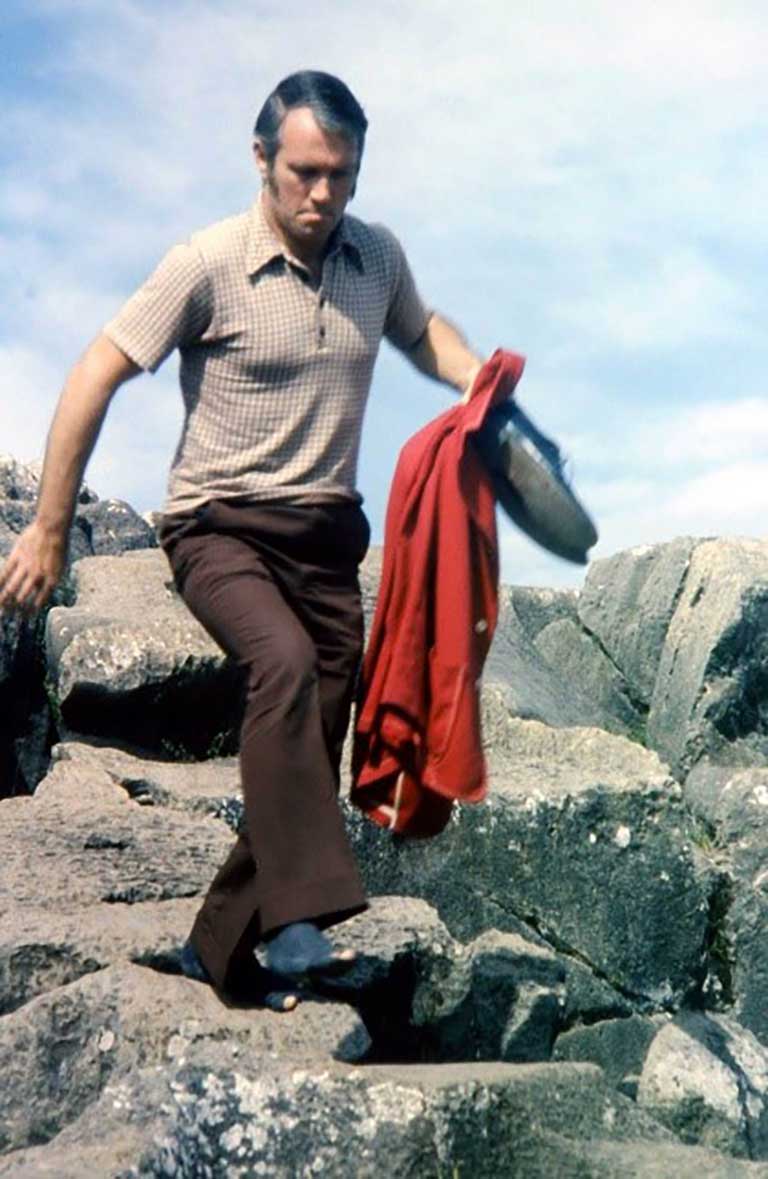
Walter Nugent, Cuzco 1969
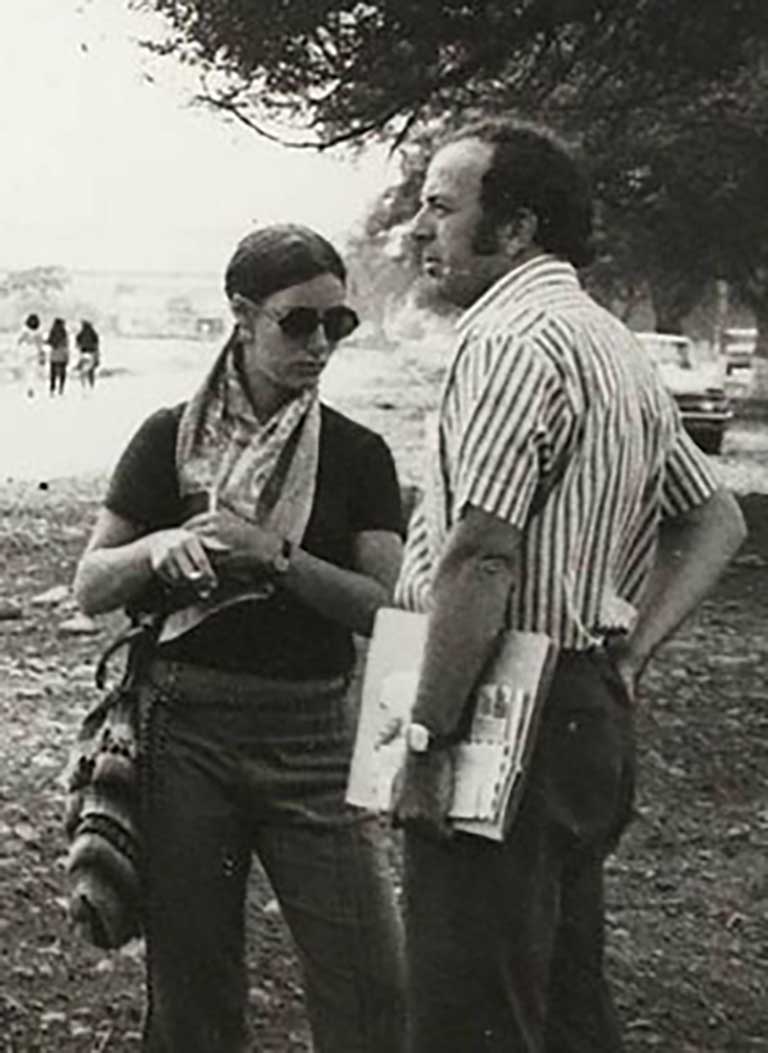
Peter Sehlinger, Lima 1972
By Kathleen Sideli, Associate VP for Overseas Study
As Indiana University will soon celebrate its Bicentennial, the Office of Overseas Study has been marking milestone events around the world as part of its own historical retrospective.
In 1959 Indiana University's first immersion program was initiated in Lima, Peru after the development of faculty-led summer programs in Europe and Mexico. IU was one of the first North American universities to send students to Latin America. Harvey Johnson, chair of Spanish and Portuguese, obtained a grant from the U.S. Department of State for a year-long undergraduate program at San Marcos University where students went to classes with their Peruvian counterparts and lived with host families. In 1961, Merle E. Simmons inherited the administration of the program led annually by a rotating on-site director. Replicating the Lima model, Professor Simmons went on to create and manage study abroad programs in Europe on behalf of the College of Arts and Sciences until 1967, when he passed the baton to Walter Nugent, associate dean of the College who established the Office of Overseas Study in 1972. The decade during which IU's Lima program was at San Marcos was a tumultuous period of political and social unrest. Nevertheless, the group there with Professor George Zucker in 1965 was so close that decades later they still get together with one another (see past article here).
With student strikes interfering with classes at San Marcos, in 1969 Professor David Gitlitz and his wife, Libby, transitioned the program to another local university, La Pontificia Universidad Católica. In remembering the difficult situation at San Marcos, Walter Nugent commented, "what saved the day was the efficiency and ingenuity with which David and Libby rearranged courses and accommodations in Lima and turned a potential disaster into a triumph." Libby later became the associate director of Overseas Study at Indiana University where she used her consummate skills for two decades to manage numerous programs, including the one in Lima.
To commemorate the 50th anniversary, the Office of Overseas Study has written to La Católica to thank them for enhancing the lives of 400 IU students during five decades. For the first 20 years at La Católica, Indiana University managed a center directed by a rotating faculty member from the U.S. assisted by local professionals. The latter included Mariel Farfán and Adela Tarnawiecki and later Mariana Mould de Pease, whose husband, Franklin Pease, taught a seminar to program students while they took other courses at La Católica.
Peter Sehlinger, the faculty director in 1972, recently wrote "the PUCP's relationship with Indiana University's Lima Program was a wonderful one. Alberto Varillas, the University's liaison with the IU program, cooperated in every way possible to make our students' academic year a rewarding one, and he offered more than academic help. He and his wife hosted one of the Indiana students in their home, and they even offered a party honoring our group." Later, as IU's associate dean for international programs, Professor Sehlinger negotiated a relationship with the Southern California Consortium on International Studies so that their students could have access to La Católica through IU's program as well as take turns sending a faculty director. This consortial approach, including a few other institutions, allowed the program to prosper until the widespread violence of Sendero Luminoso during the 1980s culminated in a suspension of IU's program in Peru in the spring of 1990. The suspension was heartbreaking to then associate dean Richard E. Stryker, who was in the first year of his 14-year tenure, since he found the Lima program to be among IU's finest study abroad opportunities.
Due to the concerted efforts of Jaime Luis Castillo, the dean for international programs at La Católica in the 1990s, and Mariana Mould de Pease, former program staff, IU's program was reinstated in 2000. However, when IU returned to La Católica it was without the previous consortium structure. Instead of having a resident faculty director on site with a staff and a few special courses, La Católica has been able to provide full support for IU students, including a full range of courses, academic advising, host-family housing and counseling for their individual situations. Faculty in the Department of Spanish and Portuguese, led by Manual Díaz-Campos for the past 15 years, interview candidates for the program every semester.
Two of the constants throughout IU's five-decade relationship with La Católica are the outstanding academic environment in which IU students are immersed, as well as the consistent professionalism of La Católica's staff and faculty. We look forward to the future of this continued partnership.
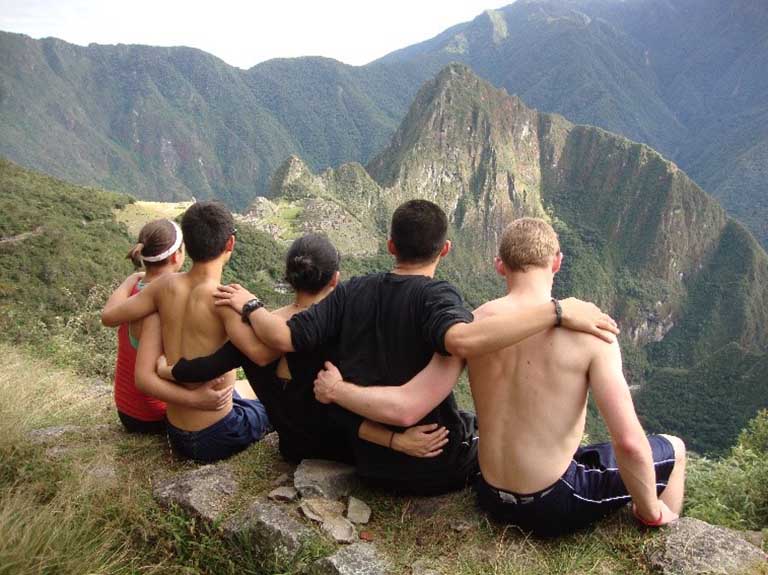
IU students at Machu Piccuh
OVSE: "Oh, the places you'll go…"
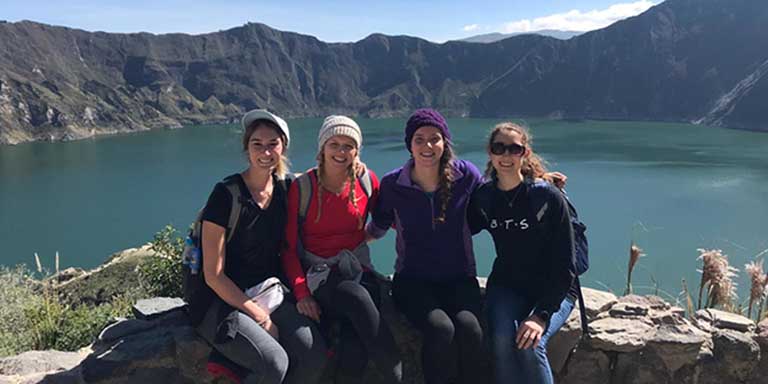
Julianna Connelly and friends in Quito
By Sam Hudson, Study Abroad Advisor for Overseas Study
When Sam Hudson started his position at the IU Office of Overseas Study as a study abroad advisor to programs in Latin America, Portugal, and Spain, he never expected to work with such unique students and programs. IU students have access to 20 study abroad programs across nine countries in Latin America, Portugal, and Spain. Typically, during a semester program an IU student takes a full load of course work but often finds that their most rewarding experiences are outside of the classroom. This article highlights some unique students who enriched their academic experiences abroad with a wide range of experiential options.
Julianna Connelly is a Spanish and English major who studied abroad during the spring 2019 semester on the Quito program, co-sponsored through IES Abroad. Throughout the semester, Julianna volunteered at a local organization in Quito called Extreme Response, as part of her service-learning class. "When I got there the kids gravitated towards me…pelting me with questions about how to say certain words in English. Within the span of one minute, I had probably translated 25 different words." Julianna will return to IU in the fall for the start of her junior year.
Katye Lester, majoring in Spanish and International Studies, studied abroad on the Madrid WIP (Wisconsin-Indiana-Purdue) program in spring 2018. Katye volunteered weekly at Fundación Balia where she worked with at-risk youth, primarily tutoring them in English and helping them to develop self-sufficient skills. "It was a really rewarding experience and definitely helped me feel more integrated into my community." Since studying abroad Katye has worked in the Office of Overseas Study as a Student Peer Counselor for the 2018-2019 academic year and leaves for the Peace Corp in Ecuador in May 2019.
Noah Roberts, O'Neill SPEA Management major and Spanish minor; also a participant on the Madrid WIP program, similarly volunteered while studying abroad. Throughout Noah's semester, he taught English to three elementary children ages 8-11 for an hour each week. "Seeing their improvement over the course of the weeks and months that I taught them made it all more than worthwhile, and the extra exposure to the Spanish culture and advice their families gave me was the cherry on top!" Since studying abroad, Noah has volunteered his time helping as a returnee for Madrid WIP orientations.
Brianna Mahnke, Spanish and International Studies major, studied abroad on the Lima IU program during the fall 2017 semester. Brianna took a course on Peruvian public health during her semester abroad. "As someone who studies global health, I loved the course in general, but some of the most interesting parts were the class projects. For one project, I had to go to a Peruvian hospital to get information from workers and interview patients about their perceptions of the treatment they received. For another assignment, I had to interview a low-income individual about their experience with health insurance in the country. These experiences were an invaluable part of my trip and allowed me to learn about Peru in an incredibly hands-on way!" After studying abroad, Brianna worked in the Office of Overseas Study as a Student Peer Counselor for the 2018-2019 academic year and is currently applying to medical school.
During academic year 2019-2020, Professor Alejandro Mejías-López, Department of Spanish and Portuguese, will be the next Resident Director of the Madrid Wisconsin-Indiana-Purdue (WIP) program. He is "looking forward to seeing students grow and thrive abroad," in addition to guiding students through a wide range of curricular and experiential opportunities, while encouraging them to get out into the culture to deepen their immersion experience.
There are many unique experiences awaiting IU students abroad. Students can start their journey today by visiting the Office of Overseas Study website, stopping by during walk-in hours Monday through Friday 10am to 4pm, or scheduling an appointment with a study abroad advisor.
National and International Guest Lectures
In addition to hosting a number of conferences and ongoing internal lecture and film series', the department welcomed the following invited scholars this year, presenting exciting new research to students and colleagues in the university community:
Abel Alves, Ball State University, "Aping Elephants in Sixteenth Century Iberia: Finding Animals 'Good to Think'."
Carmen Boullosa, Mexican poet, novelist and playwright, gave a workshop "Carmen Boullosa y los escritores mexicanos después de 1968."
Horacio Castellanos Moya, Salvadoran journalist, essayist, and novelist. He gave a public reading from his 2004 novel Insensatez; lead a post-reading discussion on a range of questions regarding Guatemala, political violence, memory, and his creative process; and conducted a workshop with graduate students and faculty on his 2013 novel, El sueño del retorno.
Alexandra Lucas Coelho, Portuguese writer and journalist, presented "518 Years of Colonial Ghosts."
Bryan McCann, Georgetown University, "Bossa Nova Longplay: Getz/Gilberto After Fifty Years (or so)."
Anélia Pietrani, Federal University of Rio de Janeiro, "Questões de Gênero e Consciência Poética em Gilka Machado, Cecília Meireles e Ana Cristina Cesar." She also presented "Literature and Human Rights."
Clara Rowland, New University of Lisbon, "Maps of True Places: Material Cartographies in the Work of Guimarães Rosa."
Marcela San Giacomo, Universidad Nacional Autónoma de México, and Mario Ernesto Chávez Peón, Instituto Nacional de Lenguas Indígenas, presented "Diversidad Lingüísica de México."
Chávez Peón, Instituto Nacional de Lenguas Indígenas, presented "Diversidad Lingüísica de México."
Julio Vélez Sainz, Universidad Complutense de Madrid, "Teatrero.Com: Una Cartografía del Teatro Español Contemporáneo."
A roundtable, Contemporary Colonialities and Mexico, was presented by Pablo García Loaeza, University of West Virginia and IU PhD alumnus; Cara Kinnally, Purdue University and IU PhD alumna; and from our department, PhD Graduate Student Beth Boyd and Professors Kathleen Myers, Alejandro Mejías-López, and Olimpia Rosenthal.
Song Festival
2019 Song Fest winners and organizers
The Spanish and Portuguese Song Festival celebrated its 9th anniversary this year. This event was founded by our Outreach and Experiential Learning Coordinator, Senior Lecturer Israel Fernando Herrera as a unique opportunity for learners and passionate students of Spanish and Portuguese to put their language and musical skills to practice. This year's festival was co-organized by Herrera and graduate student Lindsay Giacomino. The festival's Steering Committee was composed of Senior Lecturer Vania Castro, Lecturer Paul Coats, and graduate students Lara Vanin, Beth Boyd, Jonathan Caudell and Tais Carvalho.
Outstanding performances included Carson West singing with a beautiful tone "Y luego estabas tú" (original song); Jessica Oyer sang with strong emotion "Ojos del sol"; Camila Giraldo presented in a sweet Portuguese "Abraços" (by Gaby Luthai); Emma Freestone and Lydia Russel delighted the audience with "Las traseúntes" (by Jorge Drexler). Mark Bond, Jake Luburich and Ian Amstrong delivered an amazing and powerful "Motivo de alarma" (by Diego Lozenzini) that earned them third place in the festival. Sarah Chavez impressed the attendees and caught the attention of the jury with "Y volveré" (by Lucero) that resulted in her taking second place and the audience award; and Grant King wowed everyone with his magnificent voice in "Aléjate" (by Josh Groban), earning first place in the festival competition.
The select jury panel this year consisted of five renowned and expert judges: Julie Madewell, Senior Lecturer in our department, evaluated the Spanish language performance; Maria Guimarães, PhD student in our department, scored the Portuguese language; Aline Araújo, PhD student in our department, rated artistry; Rebecca Clay, a PhD student in Speech Language Pathology, gave marks for vocal performance; and Iván Maceda, a PhD student in the Jacobs School of Music, judged musicianship.
In addition to the undergraduate student competition, this year featured an exceptional lineup of guest performers, including a stellar opening act by the Mariachi Perla del Medio Oeste (second time in our festival) which gave us the honor of seeing Professor Steven Wagschal, chair of the Department of Spanish and Portuguese, playing with them. An unforgettable rhythmic performance was presented by Latino and Hispanic children from La Escuelita para Todoswhich was accompanied by famous Costa Rican singer David Dávila and our committed X370 undergraduate students, Bradley Hill, Alex Gimeno, Zoe Railing and Shahin Saberi.
The graduate performers were also outstanding. Ricardo Martins, a PhD student in Portuguese, and John "Monty" Montgomery, a PhD student in CLACS, beautifully performed with heart and soul "Para não dizer que não falei de flores". Rebecca Clay, a PhD student in Speech Language Pathology, captivated the public with her remarkable songs in Spanish and Portuguese "Soñé con ser otra mujer" and "Para machucar meu coração".
This year's event was made possible with generous support from the Office of the Vice President for Diversity, Equity and Multicultural Affairs (DEMA), Institute for European Studies (EURO), IU First Year Experience, IU Latino Studies Program, and the Neal-Marshall Black Culture Center.
Teatro VIDA explores the relationship between animal and human
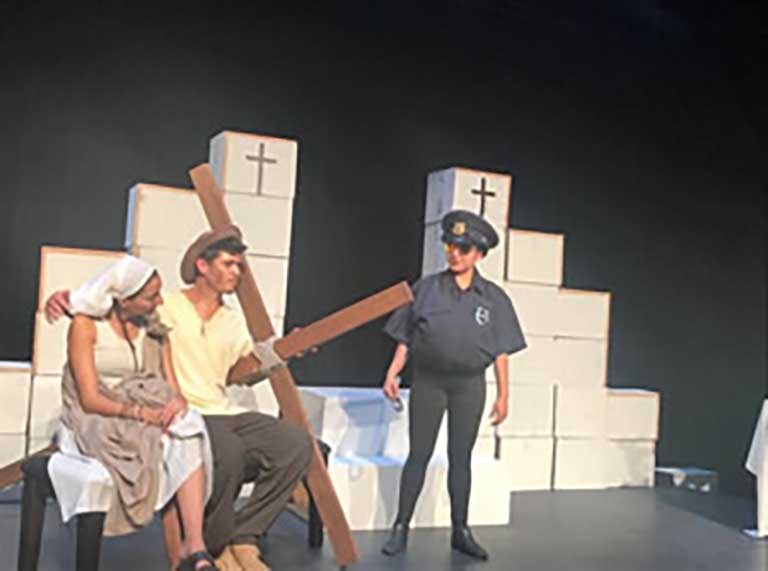
2018 VIDA show
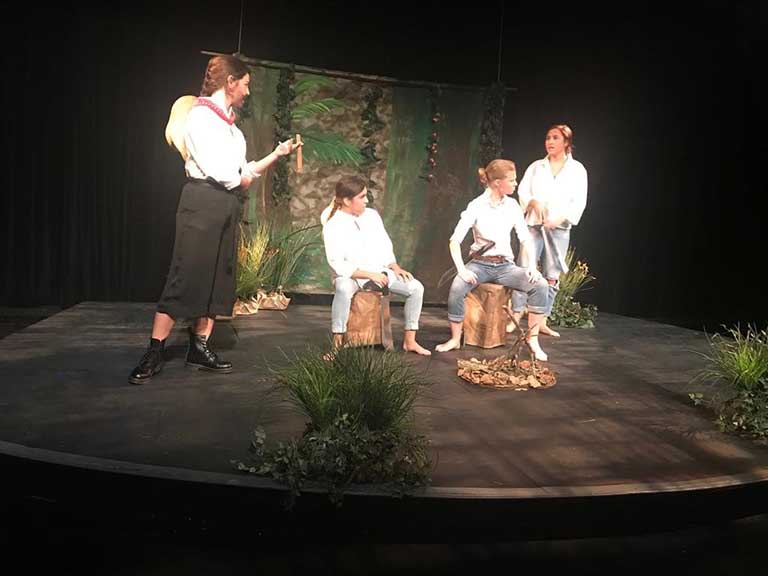
2018 VIDA show
Every year Grupo de Teatro VIDA puts together a two hour-long show featuring four different plays (three in Spanish and one in Portuguese). This past season all of our pieces were inspired by the current IU Themester ,"Animal/human". Each piece addressed the relationships between these two parts in their own unique way.
Paul Coats' adaptation of Paloma Pedrero's Resguardo Personal, for example, was about the dispute of a formerly married couple, Marta (Victoria Martine) and Gonzalo (Max Principe) over who gets to keep their dog, Nunca. As the dog becomes the apparent victim of the couple's attempts to hurt each other, the main characters' contrasting personalities were guaranteed to entertain the audience.
The adaptation of Aguilera Malta's El tigre, on the other hand, portrayed the characters' obsession with the fear of death. The play takes place "in a corner of the American rainforest", as four barefoot men armed with knives - Aguayo (Jessica McClintock), D. Guayamabe (Jessica Oyer), Tejón (Jackie Flores) and Mite (Kaitlynn Milvert) - tremble at the idea of the tiger, symbol of the fear that persecutes them. The thought-provoking choice of the directors (Mark Fitzsimmons and Maria Lopez) to have an all-women cast playing roles that portray masculine stereotypes made the performance even more fascinating to watch.
Jonathan Caudell and Aline Xavier's adaptation of Osvaldo Dragún's La historia del hombre que se convirtió en perro, a one-act play about the humiliation one has to go through in order to make ends meet, told the story of a man (Matt Williams) that takes on the difficult task of replacing the watchman's dog that passed away. The story developed as his new occupation took a toll on his relationship with his wife (Lauren Cooper) and friends (Alyssa Anglin and Clara Ganun).
Lastly, Lara Vanin's adaptation of Dias Gomes' O Pagador de promessas, told the story of Zé do Burro, whose best friend is a donkey. When it falls terminally ill, Zé promises a Pagan Saint that if his donkey recovers, he will give away his land to the poor and carry a cross all the way from his farm in the backlands of Brazil to Salvador. Upon the recovery of his donkey, Zé leaves on his journey, only to find out that keeping his promise is going to be quite difficult. This elaborate adaptation involved over 15 participants among undergraduate and graduate students (Luma Melo, Jackie Flores, Carolina Brandao Lopes, Sara Cruz, Philip Swann, Carinne Barker, Mazinha Vieira and Anabel Carmona) and the Portuguese-speaking community of Bloomington (Romario Pacheco, Osvaldo Pessoa Jr.).
At the end of fall semester, some VIDA students also performed at La Escuelita, a project that promotes the culture of Spanish-speaking countries among its young heritage speakers that live in Bloomington. It turned out to be an enriching experience for all parties involved. For over 12 years, Grupo de Teatro VIDA, as a collective work of IU faculty, graduate and undergraduate students, has helped strengthen the ties between students and the language they learn. As recognition of this effort, it was awarded the 2019 Latino Faculty and Staff Award for Distinguished IU Group.
If you are interested in joining us for next fall's performances please contact Aline Xavier at axaraujo@iu.edu.
Upcoming Events
For more information about these and other events, please see our website: https://spanport.indiana.edu
| September 13, 2019 | Annual Merle E. Simmons Distinguished Alumni Lecture and Department Fall Reception, 5:00pm – 9:00pm, Frangipani Room/Tudor Room IMU |
| September 16, 2019 | Héctor Tobar lecture, co-sponsored by Spanish and Portuguese and the College Arts and Humanities Institute. |
| October 25-26, 2019 | VIDA performances, Bloomington Playwrights Project |
| February 6-7, 2020 | Coco Fusco visit, College Arts and Humanities Institute. Times and locations TBA |